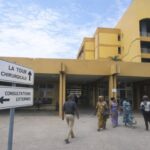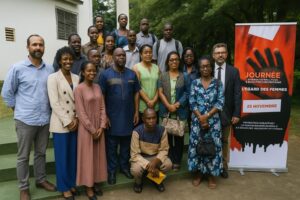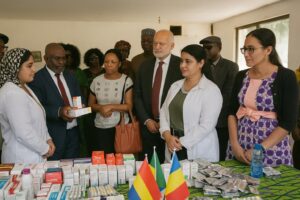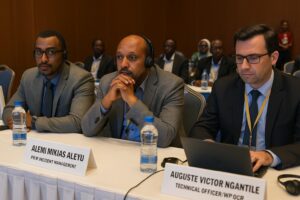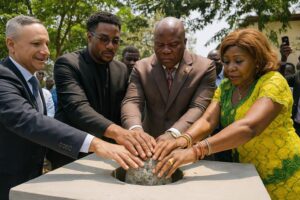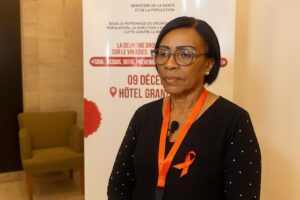Historical Milestone for Northern Healthcare
The 31-July General Hospital, the first modern facility erected in Congo’s northern corridor through Sino-Congolese cooperation in 1975, will mark its fiftieth anniversary with an initiative that transcends ceremonial symbolism. Between 23 July and 2 August 2025, its wards will host “Opération coup de poing santé”, a campaign offering preventive screening, surgical intervention and rehabilitation at no cost to patients from Owando and neighbouring districts. In a region where distance has long separated citizens from tertiary medical services, the event represents not only a humanitarian gesture but also a testing ground for decentralised health governance encouraged by Brazzaville’s current National Development Plan.
- Historical Milestone for Northern Healthcare
- State–Civil Society Synergy in Action
- International and National Expertise Converge
- Strengthening Human Capital Through Medical Practice
- Confronting Non-Communicable Disease Prevalence
- Financing the Healing Offensive
- Toward a Replicable Model for Provincial Hospitals
State–Civil Society Synergy in Action
The driving force behind the operation, Deputy Joël Abel Owassa and his platform Dynamique Owando Pluriel, presents the initiative as a concrete contribution to President Denis Sassou Nguesso’s social contract, particularly the fight against unemployment and so-called “anti-values”. By aligning a grass-roots mobilisation with ministerial endorsement, Owassa offers an illustration of the public-civic partnerships that Congolese authorities have promoted since the 2021 electoral cycle. Government officials quietly acknowledge that such highly visible but locally administered projects help translate macro-economic indicators—3.5 % projected growth in 2025, according to the IMF—into perceptible social dividends for rural constituencies.
International and National Expertise Converge
Eighteen specialist physicians drawn from France, Brazzaville, Pointe-Noire and other provincial hospitals will converge on Owando. Endoscopic surgery, still rare outside the capital, forms the clinical centrepiece. The Pan-African Urology Association has described endoscopy as “a cost-effective shortcut” to reducing the surgical backlog that afflicts many Central African states. Concurrently, an anaesthesia team from Paris will deliver refresher sessions on emergency protocols, complementing guidelines adopted by the Congolese Ministry of Health in 2023 with support from the World Health Organization. The confluence of skills is expected to shorten waiting times at Leon-Mba regional facilities and, by extension, decongest Brazzaville University Hospital, whose elective surgery schedule routinely exceeds six months (WHO 2023).
Strengthening Human Capital Through Medical Practice
A less publicised dimension of the campaign concerns the experiential training of young Congolese physicians educated in Cuba and Morocco. While their theoretical background is robust, many have lacked access to advanced equipment once back home. Owando’s upgraded theatre suites, refurbished with assistance from a Franco-Congolese NGO, will allow these practitioners to refine laparoscopic techniques under the supervision of senior consultants. The ministry views the exercise as an informal residency extension that retains talent in the national system; last year’s Health Workforce Survey indicated that 27 % of Congolese doctors trained abroad sought posts in neighbouring countries due to limited domestic exposure to high-tech procedures (World Bank 2024).
Confronting Non-Communicable Disease Prevalence
An epidemiological study commissioned for the hospital’s jubilee paints a sobering backdrop: 44 % of adults aged 40-70 in the Cuvette suffer from diabetes mellitus, while hypertension affects more than half of the same cohort. These rates surpass continental averages by a factor of two, urging policymakers to re-evaluate lifestyle-oriented prevention. The forthcoming campaign therefore dedicates considerable resources to early detection—glucometry, lipid profiles, ophthalmologic screening—and to patient education on diet and physical activity. By integrating prevention within an acute-care effort, organisers hope to demonstrate a cost curve that favours front-loading investments; global modelling by the Lancet Commission suggests each dollar allocated to non-communicable disease prevention in low-middle-income nations yields three dollars in long-term savings.
Financing the Healing Offensive
The 13 375 000 FCFA gathered through local fundraising covers essential consumables, while the ministry provides pharmaceuticals from its revolving stock. Observers note that the amount, though modest in macroeconomic terms, symbolises a shift towards blended financing. Private grocery cooperatives, expatriate alumni networks and even a digital crowdfunding platform contributed, demonstrating the diasporic appetite for targeted, transparent health engagement. A senior treasury official, requesting anonymity, stated that such micro-donor frameworks could complement the forthcoming Social Support Fund announced in the 2024 budget, thereby stretching fiscal space without contradicting debt-service commitments brokered with international partners.
Toward a Replicable Model for Provincial Hospitals
Presidential advisers have already floated the prospect of replicating the Owando template in Plateaux and Sangha, pending post-event metrics. Key performance indicators include patient throughput—organisers forecast between 500 and 1 000 beneficiaries—surgical success rates and follow-up compliance at primary health posts. Should these indices meet the thresholds validated by the National Health Information System, a cascade of mini-campaigns could be incorporated into the government’s decentralisation roadmap, reinforcing the president’s pledge to bridge the urban-rural divide. For diplomats stationed in Brazzaville, the initiative offers a laboratory for evaluating the efficacy of soft-power partnerships that do not entail large-scale concessional loans yet generate palpable goodwill among Congolese citizens.

